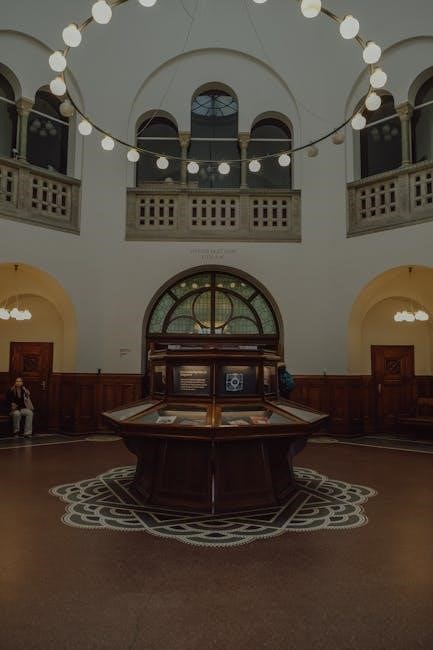1.1 Overview of the Novel
The Circle by Dave Eggers is a dystopian novel exploring themes of technology, privacy, and societal control. It follows Mae Holland as she joins a powerful tech company advocating total transparency, raising questions about the ethics of unchecked technological advancement and its impact on human relationships and freedom. The book has sparked significant discussions about modern tech culture and its implications for individual privacy. Available as a PDF download, the novel remains a relevant commentary on digital society.
The Circle by Dave Eggers is a thought-provoking dystopian novel that delves into the intersection of technology, privacy, and societal control. The story follows Mae Holland, a young woman who joins a powerful tech company called The Circle, which advocates for total transparency and connectivity. As Mae becomes deeply embedded in the company’s culture, she begins to question the ethical implications of its practices. The novel explores themes of surveillance, individuality, and the loss of privacy in a hyper-connected world. Available as a PDF download, the book offers a chilling commentary on the potential dangers of unchecked technological advancement and its impact on humanity. Through its engaging narrative and relatable protagonist, The Circle challenges readers to reflect on the consequences of a society that values sharing and openness above all else. The novel has been widely discussed for its relevance to modern tech culture and its ability to spark critical conversations about the future of digital society. Fans of dystopian literature will find The Circle to be a compelling and timely read, offering insights into the tensions between innovation and personal freedom. The PDF version of the book is easily accessible online, making it convenient for readers to explore this important work. With its gripping storyline and profound themes, The Circle remains a significant contribution to the genre, urging readers to think critically about the role of technology in their lives. The novel’s exploration of a world where privacy is virtually nonexistent serves as a cautionary tale, prompting readers to evaluate the trade-offs of living in an increasingly digital world. By examining the experiences of Mae Holland and the pervasive influence of The Circle, Eggers provides a nuanced critique of the tech industry and its far-reaching implications for society. The PDF download of The Circle is a valuable resource for anyone interested in exploring these pressing issues through a compelling literary lens.
1.2 Publication Details
The Circle by Dave Eggers was first published in 2013 by McSweeneys Books in San Francisco. The novel spans 497 pages in its hardcover edition and has since been released in various formats, including paperback and digital versions. A PDF download of the book is widely available online, making it accessible to readers globally. The book has garnered significant attention for its timely commentary on technology and society, earning it a spot as a finalist for the National Book Award. Its publication marked a pivotal moment in the discussion of digital ethics and privacy, resonating with readers worldwide. The PDF version has further amplified its reach, ensuring its themes remain relevant in an increasingly connected world.
1.3 Genre and Themes
The Circle falls under the genre of dystopian fiction, exploring themes of technology, society, and individual freedom. Central to the novel are concerns about privacy, surveillance, and the loss of autonomy in a hyper-connected world. Eggers examines the tension between transparency and personal freedom, as well as the ethical implications of unchecked technological advancement. The novel also delves into conformity versus individuality, critiquing the pressures to assimilate into societal norms. These themes resonate strongly in the digital age, making the book a thought-provoking commentary on modern life. The PDF version of the novel has further expanded its accessibility, ensuring its themes reach a broader audience.

Plot Summary
The Circle follows Mae Holland as she joins a powerful tech company advocating total transparency. Her rise within the company sparks conflicts between personal freedom and societal control, exploring the consequences of unchecked technological influence on human relationships and ethics. Available as a PDF download, the novel vividly portrays a dystopian vision of a hyper-connected world where privacy and autonomy are increasingly eroded.
2.1 Main Character: Mae Holland

Mae Holland is the protagonist of The Circle, a young and ambitious woman who joins the tech giant with idealistic hopes. Her journey reflects the tension between personal identity and societal expectations. Initially enthusiastic about the company’s vision, Mae gradually faces moral dilemmas as the demands of total transparency collide with her private life. Her character evolves from an outsider to a central figure, illustrating the human cost of a hyper-connected world. Mae’s story serves as a lens to explore the novel’s themes of autonomy, ethics, and the impact of technology on human relationships.
2.2 The Circle Company
The Circle is a powerful tech corporation in Dave Eggers’ novel, resembling a combination of modern giants like Google and Facebook. The company’s mission is to promote total transparency and connectivity, creating a utopian vision of a unified digital world. Its influence extends beyond technology, shaping societal norms and individual behavior. The Circle’s campus symbolizes innovation and progress, but beneath its idealistic facade lies a system of surveillance and control. The company’s relentless pursuit of data and transparency raises critical questions about privacy, freedom, and the ethics of technological advancement.
2.3 Key Events and Conflicts
Mae Holland’s journey begins with her enthusiasm for the Circle’s ideals, but she soon faces moral dilemmas as the company’s intrusive practices escalate. Her relationship with Ty Gault introduces tension, as his mysterious nature challenges her loyalty to the Circle. The company’s relentless push for transparency leads to ethical conflicts, particularly when Mae’s personal life becomes public. Meanwhile, her roommate Mercer’s resistance to the Circle’s influence adds depth to the narrative. The climax revolves around Mae’s pivotal decision, which forever alters her life and the company’s trajectory, highlighting the consequences of unchecked technological ambition.

Main Characters
3.1 Mae Holland
Mae Holland is the protagonist, a young woman who joins the Circle, initially idealistic but increasingly conflicted by the company’s invasive practices.
3.2 Ty Gault
Ty Gault is a mysterious figure within the Circle, whose true identity and motives challenge Mae’s perception of the company and its leadership.
3.3 Eamon Bailey
Eamon Bailey is a co-founder of the Circle, charismatic and visionary, who promotes radical transparency, blurring the lines between progress and manipulation.
Mae Holland is the protagonist of The Circle, a young woman eager to prove herself in a powerful tech company. Initially enthusiastic about the Circle’s mission of transparency and innovation, she faces increasing moral dilemmas as the company’s invasive practices encroach on her privacy. Her internal conflict escalates as she’s pressured to share every aspect of her life online, challenging her values and sense of self. Her journey reflects the tension between personal autonomy and the allure of technological advancement. As a PDF download, the novel offers a digital exploration of her struggle, mirroring the very themes of technology’s pervasive influence on modern life.

Ty Gault is a mysterious figure in The Circle, introduced as a former employee who becomes a symbol of resistance against the company’s oppressive practices. His true identity and motives remain ambiguous, adding depth to the narrative. Ty’s interactions with Mae challenge her perception of the Circle’s ideals, forcing her to question its ethical foundations. Through his enigmatic presence, Eggers highlights the tension between individual freedom and corporate control. The PDF version of the novel captures Ty’s subtle yet profound influence on Mae’s journey, making him a pivotal character in the story’s exploration of power and conformity.
Eamon Bailey is a co-founder of The Circle and a central figure in its leadership. His charisma and visionary rhetoric shape the company’s mission, emphasizing transparency and connectivity. As one of the “Three Wise Men,” he plays a pivotal role in the novel’s exploration of power and control. Eamon’s influence over Mae Holland highlights his ability to inspire loyalty, while his true motives remain shrouded in ambiguity. The PDF version of the novel underscores his significance in the narrative, revealing the dangers of unchecked power and the erosion of personal privacy in a hyper-connected world.
Themes in “The Circle”
The Circle explores themes of technology and society, privacy and surveillance, and individuality vs. conformity. The novel highlights the tension between progress and personal freedom, sparking debates on digital ethics and corporate power, while its PDF availability ensures accessibility for global readers to engage with these critical issues.
4.1 Technology and Society
The Circle by Dave Eggers delves into the intricate relationship between technology and society, portraying a world where a powerful tech company influences every aspect of life. The novel critiques the unchecked growth of digital platforms, highlighting how they blur the lines between progress and control. Through Mae Holland’s journey, Eggers examines the societal implications of total connectivity, raising questions about privacy, autonomy, and the ethical responsibilities of tech giants. The PDF version of the book offers readers a convenient way to engage with these timely and thought-provoking themes.
4.2 Privacy and Surveillance
Privacy and Surveillance are central themes in The Circle, as the novel portrays a society where constant monitoring is normalized. The Circle’s mantra of transparency leads to the erosion of personal boundaries, with employees and users subjected to pervasive surveillance. Through Mae’s experiences, Eggers illustrates the tension between the benefits of connectivity and the loss of individual privacy. The PDF version of the book provides a stark reminder of the dangers of unchecked technological intrusion into private lives, echoing concerns about modern tech platforms.
4.3 Individuality vs. Conformity
Individuality vs. Conformity is a recurring theme in The Circle, as the novel critiques the pressure to conform to societal and technological norms. The Circle promotes a culture of homogeneity, discouraging dissent and rewarding uniformity. Mae’s journey reflects this tension, as her initial independence gives way to the company’s expectations. The PDF version of the book highlights how conformity is enforced through surveillance and social conditioning, ultimately stifling creativity and authentic self-expression. This theme resonates with modern concerns about the homogenization of culture in digital spaces.
The Setting
The Circle is set in a futuristic tech campus and a pervasive digital world, blending physical and virtual environments that shape the story’s themes and characters, as detailed in the PDF version.
5;1 The Circle Campus

The Circle Campus, as depicted in the PDF version of the novel, is a sprawling, futuristic complex symbolizing innovation and control. Its design, with vibrant colors and cutting-edge architecture, reflects the company’s ideals of transparency and progress. The campus serves as both a workplace and a community, fostering a culture of constant surveillance and connectivity. This setting centralizes the story, emphasizing the blending of personal and professional lives under the company’s watchful eye.
5.2 The Digital World
In The Circle, the digital world is a realm of total connectivity, where social media, surveillance, and data collection dominate. The company’s technologies create a society where privacy is virtually nonexistent, and sharing becomes the ultimate virtue. This digital landscape, explored in the PDF version of the novel, reflects a dystopian vision of unchecked technological advancement, where individuals are pressured to conform to a culture of transparency and constant sharing, leading to a loss of personal autonomy and freedom.
Author Background
Dave Eggers is a renowned American author known for his unique writing style and thought-provoking themes. His work often explores technology’s impact on society, as seen in The Circle, a novel that critiques the digital age and its effects on privacy and individuality. Available as a PDF download, the book reflects Eggers’ ability to blend dystopian fiction with contemporary issues, making it a significant contribution to modern literature. His writing continues to spark crucial discussions about technology’s role in shaping human experiences.
6.1 Dave Eggers’ Writing Style
Dave Eggers’ writing style in The Circle is both engaging and thought-provoking. He masterfully blends dystopian fiction with contemporary societal critiques, creating a narrative that feels eerily relevant. Eggers uses detailed descriptions and relatable characters to explore complex themes like technology’s impact on society. His prose is clear and direct, yet layered with deeper meanings, making the novel accessible while prompting readers to reflect on their own digital lives. The PDF version of the book maintains this style, offering a seamless reading experience that underscores Eggers’ ability to evoke both emotion and introspection.
6.2 Inspiration for “The Circle”
Dave Eggers drew inspiration for The Circle from the rapid evolution of technology and its influence on society. Observing Silicon Valley’s dominance and the rise of platforms like Google and Facebook, Eggers explored themes of privacy, surveillance, and the loss of personal freedoms. His work reflects concerns about data monetization and the ethical dilemmas posed by tech giants. The novel’s premise was also influenced by real-world debates about digital privacy, making it a timely commentary on modern life. The PDF version of the book captures these ideas, offering readers a thought-provoking narrative on technology’s societal impact.

Reception and Reviews
The Circle has sparked intense debate, with critics praising its relevance to modern tech culture. The PDF version highlights Eggers’ timely commentary on digital privacy and societal control, resonating with readers globally.
7.1 Critical Response
Critics have praised The Circle for its timely exploration of technology’s impact on society. The novel’s depiction of a tech giant mirroring companies like Google and Facebook resonated widely. Reviewers highlighted Eggers’ ability to provoke thought on privacy and surveillance. While some found the narrative uneven, the book’s relevance to modern concerns earned it acclaim. The PDF version has been particularly popular, making the story accessible to a broader audience. Overall, The Circle is regarded as a significant commentary on digital culture and its ethical dilemmas.
7.2 Public Reception
The public reception of The Circle has been overwhelmingly positive, with readers drawn to its eerily familiar portrayal of a tech-dominated world. The PDF version has been widely downloaded, making the novel accessible to a global audience. Many readers appreciated its thought-provoking themes, while others noted its striking relevance to contemporary issues like data privacy and social media influence. The book’s ability to spark debates about technology’s role in society has solidified its place as a must-read in the digital age, resonating with both tech enthusiasts and critics alike.

Comparisons to Other Dystopian Novels
The Circle is often compared to classics like 1984 and Brave New World, but Eggers’ focus on modern tech and data control offers a fresh, contemporary twist on dystopian themes.
8.1 Similarities to “1984”
The Circle draws striking parallels to George Orwell’s 1984, particularly in its depiction of pervasive surveillance and societal control. Like Big Brother, the Circle’s omnipresent technology monitors every aspect of life, eroding privacy and fostering self-censorship. Both novels explore themes of authoritarianism, manipulation of truth, and the loss of individual freedom. Eggers’ vision of a tech-driven dystopia mirrors Orwell’s warnings about totalitarianism, emphasizing the dangers of unchecked power and the erosion of personal autonomy in the name of progress and security.
8.2 Differences from “Brave New World”
While both The Circle and Brave New World depict dystopian societies, they differ in their approach to control. Brave New World relies on genetic engineering and a rigid caste system, emphasizing consumption and conformity through biological and psychological conditioning. In contrast, The Circle focuses on technological surveillance and data collection, promoting a culture of transparency and voluntary surrender of privacy. Eggers’ novel critiques modern tech culture, whereas Huxley’s work explores a futuristic society structured by industrialized biology and hedonism. Both novels warn against loss of individuality but through distinct societal mechanisms.
The Sequel: “The Every”
The Every, Dave Eggers’ sequel to The Circle, delves into a tech company’s relentless pursuit of total observation and control, mirroring modern concerns about data dominance and privacy erosion.
9.1 Plot Continuation
The Every continues the story of the tech giant from The Circle, expanding its reach and influence. The novel explores the company’s relentless pursuit of total data collection and control, delving into the ethical dilemmas of a society governed by algorithms and surveillance. Eggers examines how the blending of technology and daily life reshapes human interactions and privacy, offering a chilling vision of a world where personal freedom is increasingly surrendered for the sake of convenience and connectivity. The sequel deepens the critique of modern tech culture.
9.2 Themes in “The Every”
The Every delves into themes of total surveillance, data monopolization, and the erosion of privacy. Eggers critiques the unchecked power of tech giants, exploring how they manipulate public opinion and control personal data. The novel examines the tension between innovation and ethical responsibility, questioning the true cost of a hyper-connected world. Through its narrative, The Every challenges readers to reflect on the consequences of relying on technology for every aspect of life, echoing concerns raised in The Circle about the loss of individual autonomy. The sequel serves as a warning about the dangers of complacency in a tech-driven society.

Symbolism and Motifs
The Circle employs symbolism like the all-seeing Circle itself, representing total surveillance and control. The color white signifies purity and sterility, reflecting the company’s oppressive uniformity. Wheatpaste, a recurring motif, symbolizes the blending of art and technology, highlighting the tension between creativity and conformity in a hyper-digital world. These elements reinforce the novel’s themes of transparency and the loss of individuality.
10.1 The Circle Symbol
The Circle symbol, the company’s logo, represents unity and wholeness, embodying its ideals of transparency and connectivity. However, it also serves as a constant reminder of surveillance and control, reinforcing the loss of privacy and autonomy. The Circle’s all-seeing nature mirrors the themes of technology’s pervasive influence and the erosion of individuality. Its presence throughout the novel underscores the tension between the company’s utopian vision and the oppressive reality it creates, symbolizing both innovation and the stifling of personal freedom in a hyper-connected world.
10.2 The Color White
The color white in The Circle symbolizes purity, innocence, and clarity, reflecting the company’s idealistic mission of transparency. The pristine white architecture of the Circle’s campus and the minimalist design of its uniforms evoke a sense of cleanliness and order. However, this symbolism also underscores the oppressive nature of the company, as white represents a lack of individuality and the erasure of personal boundaries. The pervasive use of white highlights the tension between the Circle’s utopian facade and its underlying surveillance and control, emphasizing the loss of privacy in a world dominated by technological advancement.
Cultural Impact
The Circle has sparked global discussions on technology’s role in society, influencing debates on privacy and inspiring artistic expressions like wheatpaste murals reflecting its themes.
11.1 Influence on Tech Discussions
The Circle has significantly influenced discussions on technology, privacy, and corporate power. Its portrayal of a tech giant mirroring companies like Google and Facebook has sparked debates about data ethics and surveillance. The novel’s themes of transparency and control have resonated with critics of Big Tech, highlighting the tension between innovation and individual rights. Eggers’ work has also been cited in discussions about the erosion of privacy norms, making it a pivotal text in contemporary tech critiques and inspiring both fear and reflection on our digital future.
11.2 Adaptations and Media
The Circle has been adapted into a film in 2017, directed by James Ponsoldt, starring Emma Watson and Tom Hanks. The movie explores the same themes of privacy and corporate power, though it received mixed reviews. Additionally, the novel has been released as an audiobook, narrated by Dion Graham, offering listeners a immersive experience of Eggers’ vision. These adaptations have further amplified the book’s cultural relevance, making its critique of tech-dominated society accessible to a broader audience while sparking discussions on its timely themes.

Educational Use
The Circle is increasingly adopted in school curriculums for its thought-provoking themes. The PDF version is widely used, fostering debates on technology’s role in society and encouraging critical thinking among students.
12;1 In School Curriculums
The Circle is increasingly integrated into high school and college curriculums due to its relevance to modern societal issues. Educators use the novel to explore themes like technology, privacy, and ethics. The availability of The Circle book PDF makes it accessible for classroom use, facilitating discussions on digital culture. Its thought-provoking narrative encourages critical thinking about the impact of tech companies on personal freedoms. The novel aligns with educational goals of fostering analytical skills and preparing students for debates about the future of technology in society.
12.2 Discussion Topics
The Circle by Dave Eggers offers rich material for classroom debates, focusing on themes like privacy, surveillance, and the ethics of technology. Students can explore how the novel portrays a society obsessed with transparency and connectivity. Discussions can delve into the implications of a world dominated by a single tech company, encouraging critical thinking about data privacy and individual freedom. The availability of The Circle book PDF makes it easier for educators to assign readings and facilitate meaningful conversations about these timely issues.
The Circle by Dave Eggers concludes with a haunting reflection on technology’s pervasive influence, urging readers to reconsider their digital footprints and privacy in a hyper-connected world, now available as a thought-provoking PDF read.
13.1 Final Thoughts
The Circle by Dave Eggers offers a chilling yet thought-provoking exploration of a world dominated by technology. Through Mae’s journey, Eggers highlights the dangers of unchecked corporate power and the erosion of privacy. The novel serves as a cautionary tale, urging readers to reflect on the consequences of surrendering personal freedoms for the sake of connectivity. Its relevance in today’s digital age makes it a must-read, available as a PDF download for those seeking a deeper understanding of our increasingly connected world.
13.2 Relevance in Modern Society
The Circle remains deeply relevant in today’s society, as it critiques the pervasive influence of technology and corporations on personal privacy. The novel’s exploration of data exploitation and surveillance mirrors contemporary concerns about platforms like Facebook and Google. Eggers’ depiction of a world where privacy is increasingly eroded resonates with modern debates over digital rights. Available as a PDF download, the book continues to prompt essential discussions about the balance between connectivity and individual freedom, making it a vital read for understanding our tech-driven world.
